Every weekday morning at 8:30, Samaritan’s Purse has “chapel.” Since Samaritan’s Purse is a mission of Franklin Graham (Billy Graham’s son), it should not be a surprise that this is a decidedly a Protestant-type worship service. Father Bob and I attended the service on this, our first day in Lui.
One of the things that struck everyone in our group was the positioning of the chapel within the Samaritan’s Purse compound. The chapel is in the very center of the compound. All of the nursing, surgical, obstetric, pediatric, and other wards are on the periphery. The worship space – the chapel – is in the center. And it’s also in the center of their schedule and their lives. The hospital begins operating fairly early. But everything stops for chapel service at 8:30. The doctors, surgeons, nurses, and administrators go to chapel. The patients and their families go to chapel. The people of the surrounding village come to chapel. These people are deeply immersed in their medical ministries. But when the bell rings at 8:30, they all leave their posts to come pray and worship together. It’s a very powerful witness to the fact that medicine can go only so far, and then faith and prayer must take over.
We Missourians were struck by that. We contrasted it with the experiences many of us have had. Go into any Missouri hospital, and ask the staff, “Where’s the chapel?” and most folks on the hospital staff would be hard-pressed to tell you. For us, the chapel – the place of prayer – is on the periphery. But in Lui, it’s in the center of the space and in the center of the people’s schedule.
So on this first day in Lui, Father Bob and I made our way to the SP chapel for the 8:30 service.
The first thing that struck me was the singing. It was so passionate and spirited! I’ve said to some friends (since coming home) that it’s as if they were singing for their lives.
Some people have asked me to talk about the kind of musical instruments they have in Lui. I saw one person using a guitar in a service. But aside from that, the only "instruments" are percussion "instruments." They have gourds [they call them "GAH-ruh"] filled with seeds. And they have devised an instrument that consists of branches with metal strips attached to them, which they can beat on the floor to create a very nice sound. And drums. Drums, drums, drums. Drums are the beat of Lui!
Darius preached [not the Darius also called "Mahn-yah-GOO-goo" with whom we worked so closely all week], and he was amazing – all extemporaneous, but obviously well prepared. He preached about being free in Christ and not turning back. It was so multi-layered, as he wove together the social/political freedom and peace that have come to Sudan and Lui – along with the freedom/peace that Jesus brings – and urging them to sustain the peace in both senses – and “not turn back” to the old witchcraft ways or to the warfare ways. (And we sang the song, “No, no, no, no, no, I will never go back anymore,” which became one of my favorites.)
After worshipping with the folks at SP, Father Bob and I went on a tour of the grounds.
Folks who have visited Lui before may be happy to know that the Nursing School is now completed.
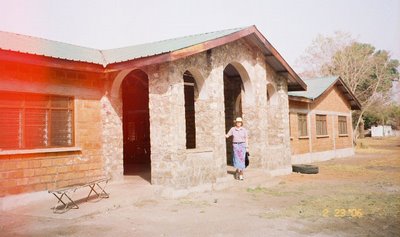 And they are holding classes there regularly.
And they are holding classes there regularly.We had two particularly striking encounters.
First, as we went walking behind the SP compound (toward the new tuberculosis barracks), we noticed an old woman sitting on the ground with a kettle, using a small stick to scrape out beans from the bottom of the kettle. From our distance, I could not tell what she was doing, and I was puzzled to know more, so we approached her. As we got closer, she gave me the “dirty-hand shake,” then [Bob noticed this; I didn’t] offered us some of her food! She had so little food that she was scraping it out of a bowl with a twig; but when strangers approached, she offered us some of it. I was stunned, and tears welled up. What incredible generosity! I do not think we would see that in the U.S. – to our shame.
Second, we noticed a group of women under a tree around a tukel. We stopped to visit with them. Two seemed to be young women (maybe early 20s), and they looked healthy. With them was a woman that initially looked ancient, but after I talked with her I realized she was probably much younger than I – maybe in her 40s. She was completely wasted away. Her sisters explained she had some “wasting disease” and was in the care of Samaritan’s Purse. And she was cradling an adorable infant. We talked at length with Anna (one of the younger women) and learned that she is on the SP staff. Today was her “day off,” but – because she had to care for her very ill sister – she would need to spend most of the day going back and forth to the borehole to gather enough water for her sisters to survive the rest of the week. Words fail me.
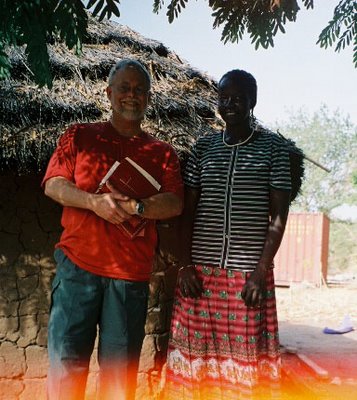 This is a photo of Father Bob and Anna.
This is a photo of Father Bob and Anna.During the afternoon, Father Bob led a session for the Diocese’s deacons. I did not participate in that session. I had other fish to try …
As I’ve mentioned, I felt a powerful need to get my belongings organized. The tukels have no furniture (dressers, shelves, etc.). All you have is your cot, and whatever luggage you brought. It was making me crazy to have things so disorganized.
So I spent considerable time this afternoon organizing my tukal. Fortunately, I had brought bungee cords and caribiners, and I was able to use them (plus by trusty Ziplocs) to organize things into categories way beyond what any “normal” mortal should need to organize. But it’s what I needed.
At the risk of revealing just how wacky I am, I am including this photograph of the results of my tukel-organizing project.
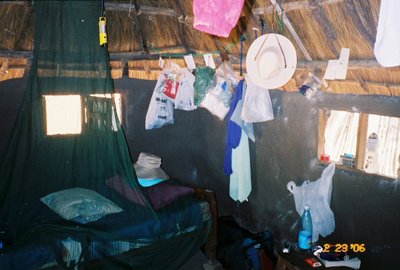
I had strung bungee cords across the corners of the tukel, then used smaller Ziploks and carabiners to attach things sorted by function or category. So, for instance, I had one bag for fresh camera film and one for exposed film, one for fresh batteries and one for used batteries, one for antibacterial wipes, one for first aid, and so on. Other things -- things to which I did not need daily access -- got tucked into my suitcase or duffel and tucked under the cot. And to top it all off, because I really do have a crazy sickness when it comes to organization, I created an "index" to the suitcase/duffel contents, and posted that index on one of the horizontal branches supporting our roof. (If you're observant, you can just make it out in the upper right section of this photograph.
When all was said and done, and Sandy came home from her travels that day, my fellow missioners just cracked up! It was just about the most outrageous thing they had seen said -- and surely one of the more outrageous things they had seen in Lui. And I shared in their laughter. Heck! I knew it was crazy. But I also knew it was what I needed. But they also pronounced "it is good.” And that's when I got stuck with the “Martha” moniker, which stuck throughout the remainder of our stay.
But maybe I wasn't completely crazy. For when I left Lui, Deborah happily accepted all my bungee cords, carabiners, and Ziploc bags. I wonder what she'll do with them . . .
In the midst of my work that day, I realized I was not doing very well physically. I had tried to stay hydrated and eat reasonably, but I found myself feeling pretty woozy. And I still had that headache that had lasted ever since arriving in Mundri. I realized I was either dehydrated or in need of some nutrition. I needed some of the Gatorade I had brought. But then I ran into a problem. The Gatorade mix had a big scoop, and I had a liter bottle with a small mouth, so how was I going to get that big scoop into that little bottle opening?
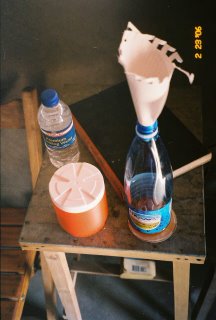 For there are few kitchen doo-dads in Lui – and certainly no funnels. But I figured it out: just take a page out of your journal to create a funnel!
For there are few kitchen doo-dads in Lui – and certainly no funnels. But I figured it out: just take a page out of your journal to create a funnel!Later in the afternoon, as Father Bob & I sat in the compound, I feared we “met our dinner.” Here came Ishmael with a rooster upright in his hand, its legs banded together.
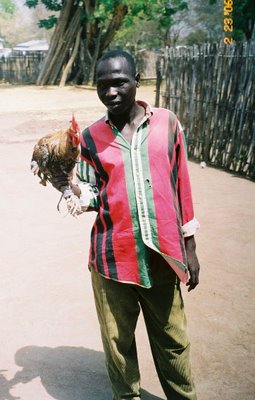 I must say, it’s been a long time since I’ve had a relationship with my entrée. [Postscript: As I got more familiar with how things work in Lui, I realized he was not our dinner after all. He was a resident rooster, and was merely being retrieved to the compound.]
I must say, it’s been a long time since I’ve had a relationship with my entrée. [Postscript: As I got more familiar with how things work in Lui, I realized he was not our dinner after all. He was a resident rooster, and was merely being retrieved to the compound.]




No comments:
Post a Comment